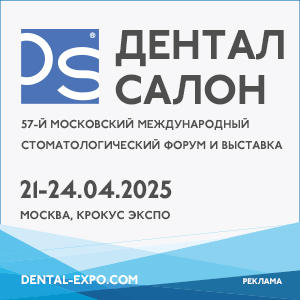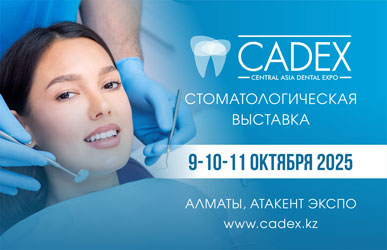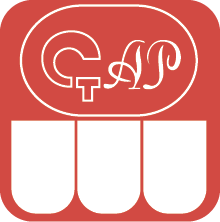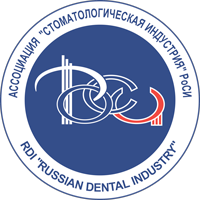DOI:
10.37988/1811-153X_2020_4_19Исследование структуры минерального компонента эмали зубов при дисплазии соединительной ткани методами денситометрии и атомно-силовой микроскопии в позднем постнатальном периоде онтогенеза
Аннотация
Цель работы — дать количественную и качественную характеристику структуре минерального компонента эмали ретинированных зубов при дисплазии соединительной ткани и без нее в различные периоды позднего постнатального онтогенеза человека методами денситометрии и атомно-силовой микроскопии. Материалы и методы. Удаляли 3.8, 4.8 зубы, не имеющие контакта с ротовой жидкостью, у 60 мужчин с дисплазией соединительной ткани и без нее (возрастные группы: 31—40, 41—50, 51—60 лет). Денситометрическую оценку плотности неорганического компонента эмали проводили в программе Kodak Dental Systems. Форму, упаковку, расстояние между эмалевыми призмами анализировали в программе Image Analysis NT—VDT. Результаты. Установлено, что после 30 лет в ретинированных зубах наблюдается выраженный эмалевый метаболизм, характеризующийся изменением формы, плотности упаковки и расстоянием между эмалевыми призмами. Показано, что при дисплазии соединительной ткани темпы созревания эмалевых призм в позднем постнатальном периоде онтогенеза снижены. Заключение. При дисплазии соединительной ткани наблюдается картина незавершенного амелогенеза с низкой плотностью упаковки и большим расстоянием между эмалевыми призмами.
Ключевые слова:
эмалевые призмы, дисплазия соединительной ткани, возраст, денситометрия, атомно-силовая микроскопияДля цитирования
Список литературы
- Антонова И.Н., Гончаров В.Д., Кипчук А.В., Боброва Е.А. Особенности морфологического строения неорганической составляющей эмали и дентина зуба человека на наноуровне. — Морфология. — 2014; 146 (5): 52—6. eLIBRARY ID: 22307557
- Вагнер В.Д., Конев В.П., Коршунов А.С. Изменение минерального компонента эмали зубов при дисплазии соединительной ткани в возрастном аспекте. — Институт стоматологии. — 2019; 83 (2): 20—1. eLIBRARY ID: 39184688
- Вагнер В.Д., Конев В.П., Коршунов А.С. Изучение возрастных изменений минерального компонента и органического матрикса эмали зубов человека методами электронной и атомно-силовой микроскопии. — Клиническая стоматология. — 2019; 91 (3): 4—6. eLIBRARY ID: 41188345
- Вагнер В.Д., Конев В.П., Коршунов А.С., Серов Д.О. Исследование призматических оболочек органического матрикса эмали зубов человека методом атомно-силовой микроскопии в постнатальном периоде онтогенеза. — Институт стоматологии. — 2019; 84 (3): 94—95. eLIBRARY ID: 40872545
- Ипполитов Ю.А. Функциональная морфология эмали человеческого зуба. — Вестник новых медицинских технологий. — 2010; 17 (2): 56—7. eLIBRARY ID: 16459532
- Коршунов А.С., Конев В.П., Московский С.Н., Фирсова В.О., Курятников К.Н., Вавакин В.Ю. Структура минерального компонента эмали ретинированных зубов в постнатальном периоде онтогенеза при дисплазии соединительной ткани. — Здоровье и образование в XXI веке. — 2018; 20 (6): 43—7. eLIBRARY ID: 35186156
- Леонтьев В.К. Эмаль зубов как биокибернетическая система. — М.: ГЭОТАР-Медиа, 2016. — 72 с. eLIBRARY ID: 26074164
- Луцкая И.К., Новак Н.В., Терехова Н.В., Запашник П.Е. Основные оптические свойства постоянных зубов человека. — Клин. имплант. стомат. — 2004; 1 (4): 24—30.
- Шестель И.Л., Коршунов А.С., Лосев А.С., Шестель Л.А., Давлеткильдеев Н.А., Конев В.П. Способ изготовления препаратов зубов для морфологических исследований эмалевых призм в атомно-силовом (АСМ) и инвертированном микроскопах. — Патент RU № 2458675, действ. с 04.05.2011. eLIBRARY ID: 37496277
- Коршунов А.С., Конев В.П., Серов Д.О., Московский С.Н. Способ изготовления препаратов зубов для морфологических исследований эмалевых призм поверхностного слоя в атомно-силовом (АСМ) и инвертированном микроскопах. — Патент RU № 2702903, действ. с 14.03.2018. eLIBRARY ID: 41185196
- Коршунов А.С., Конев В.П., Вагнер В.Д., Серов Д.О., Курятников К.Н. Способ определения рентгенологической плотности пришеечной области зубов. — Патент RU № 2718300, действ. с 07.10.2019. eLIBRARY ID: 42711986
- Коршунов А.С., Конев В.П., Вагнер В.Д., Серов Д.О., Курятников К.Н. Способ определения рентгенологической плотности вершины бугорковой части зубов. — Патент RU № 2718280, действ. с 07.10.2019. eLIBRARY ID: 42711926
- Коршунов А.С., Мухин А.Н., Серов Д.О., Конев В.П., Московский С.Н., Альжанов А.М., Фирсова В.О., Курятников К.Н. Глубиномер стоматологический. — Патент RU № 187021, действ. с 02.07.2018. eLIBRARY ID: 38143488
- Шумилович Б.Р., Воробьева Ю.Б., Малыхина И.Е., Чертовских А.В. Современные представления о кристаллической структуре гидроксиапатита и процессах возрастных изменений эмали зуба (исследование in vitro). — Журнал анатомии и гистопатологии. — 2015; 4 (1): 77—86. eLIBRARY ID: 23570153
- Poggio C., Ceci M., Beltrami R., Lombardini M., Colombo M. Atomic force microscopy study of enamel remineralization. — Ann Stomatol (Roma). — 2014; 5 (3): 98—102. PMID: 25506414
- Beniash E., Metzler R.A., Lam R.S., Gilbert P.U. Transient amorphous calcium phosphate in forming enamel. — J Struct Biol. — 2009; 166 (2): 133—43. PMID: 19217943
- Beyeler M., Schild C., Lutz R., Chiquet M., Trueb B. Identification of a fibronectin interaction site in the extracellular matrix protein ameloblastin. — Exp. Cell Res. — 2010; 316 (7): 1202—12. PMID: 20043904
- Cerci B. Dental enamel roughness with different acid etching times: Atomic force microscopy study. — Eur J Gen Dentistry. — 2012; 1 (3): 187—91. DOI: 10.4103/2278-9626.105385
- Diekwisch T.G., Berman B.J., Gentner S., Slavkin H.C. Initial enamel crystals are not spatially associated with mineralized dentin. — Cell Tissue Res. — 1995; 279 (1): 149 —67. PMID: 7895256
- FitzGerald C.M. Do enamel microstructures have regular time depen-dency. Conclusions from the literature and a large-scale study. — J Hum Evol. — 1998; 35 (4—5): 371—86. PMID: 9774500
- Landis W.J., Burke G.Y., Neuringer J.R., Paine M.C., Nanci A., Bai P., Warshawsky H. Earliest enamel deposits of the rat incisor examined by electron microscopy, electron diffraction, and electron probe microanalysis. — Anat Rec. — 1988: 220 (3): 233—8. PMID: 2834985
- Lechner B.D., Röper S., Messerschmidt J., Blume A., Magerle R. Monitoring demineralization and subsequent remineralization of human teeth at the dentin-enamel junction with atomic force microscopy. — ACS Applied Materials Interfaces. — 2015; 7 (34): 18937—43. PMID: 26266571














